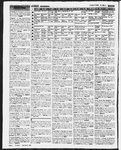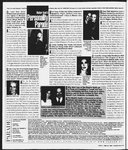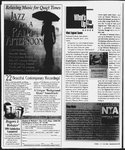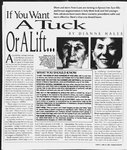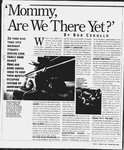| OCR Text |
Show TheSalt Lake Tribune OPINION Sunda: AA3 Victory? Maybe for KLA, But for Others There Are Too Many Questions Nobodylikesto lose. Just ask the Jazz. But ifyour teamis behind by20 points and there is one second left, you just have to say OK,that’s it. We lost. Over andout. : Thereis no way to say, well, you see . *wThis isn’t all that simple . We maynot ss. have won technically, yet morally we are =O top... . Butthat’s sports, and it has as muchto do with reallife as “Baywatch” does with the workoflifeguards. In real life, as reeent events demonstrated once again, it ‘=<doesn’t really matter what happens as “yangas you give it the right spin. The most =Wisturbing part about it is that, unlike sports, we are talking life and death here =— sometimes manydeaths, and manyru- inedlives. s- Thousandsof people died in Yugosla- via in recent months.As the peacekeepers “settle in Kosovo, more information may “We won, dammit!” Theair war was a success! Oneis, the word “NATO” is not men RUSSIAN VIEW The exceptions, for the most part, are politicians, including some prominent Utahns, who just happentofind anything President Clinton does reprehensible. cupational force for the entire Yugosla. via, allowing themto go to Belgrade and ing the fact that they do work under a vehicle, remaining totally untouchable obviously are grateful to NATO now for local law enforcement. after all, they might betheonlysidein the conflict that emerged as clear winners. But theyarenot satisfied with the agree- bouillet deal actually made them anocMICHAEL NAKORYAKOV Well now. If that’s a victory for NATO, howcome those Yugoslavsoldiers withdrawing from Kosovo are so defiant, flashing victory signs and posing for Western photographers? They were sup: posed to be “defeated,” accordingto State question any official or confiscate any loudly demandinghis ouster? There was no “unconditional surren. der,” as the one that ended the warwith jazi Germanyon May7, 1945, and British supposed to VOTEonthatif their country lost the war? Butif that wasa victoryfor Milosevic homeless, and even if part of them return as he claims, why are the NATOtroops, sults of the NATO war is an unambiguous including the Germans on their tanks with big spiderlike crosses — a sight well-remembered by older Yugoslavs — rolling into Koso And why are the voices of Serbian opposition — most of whom wholeheartedly supported Milosevic in his Kosovo policies — heard JATOgeneral. The KLAis adifferent matter. They ment’s terms, becausethey want more. As everybody who happens to rememberthe sion” over defeated Japan on Sept. 9 of and suffering of thousands that has not peoplearenot exactly BoyScouts, and the that same year. Cometothink of it, this is all there was one ciear success those issues could have been successfully current situation in Kosovo is way rent from Gen. not eventhe Gulf war's end. Then, at least, Almost a million ethnic Albanians are sponsibility for themselves in Kosovo and some smoke-screen language cover- ofthe deal. Endof war. Was it worth the enormous destruction Gen. Michael Ja people in Belgrade, including the top that nobody bothered to ask — were they Those actually were the two stumbling points that sank the Rambouillet agree- well-deserved. respect from its Western colleagues for its role in negotiating peace. The Russians want a clear-cut re. ment. They aregonenow. That'sall. End Secretary Madeleine Albright. How come slav Parliament voted for the peace deal Yet, with only a few exceptions, the all it needs is certain, and ders. They can’t even cross those borders without a special permission. The Ram- leaders, are celebrating? And,incidentally, we wereall so pleased when the Yugo- overwhelming public verdict on the re- problem who won the war. “The [NATO] aggresion is over, happy peace to usall,” he said after the agreement was signed. the same rights beyond the Kosovobor: about wells poisoned by bandits in Kosovo Liberation Army (KLA) uniform, and about schcols and hospitals smithereens by NATO's “sma ; Kosovo Serbs whowill leave there for good. the text says nothing about them, except that the KLAis supposed to “disarm.” Russia, actually, will be the lesser They, of course, say it was a miserable defeat. Andthen,there is Yugoslav President Slobodan Milosevic who says it was he Douglas MacArthur's who took there will probably be at least as many de-facto presence in Kosovo's capital. But security force (KFOR). deployed in Kosovo “underUnited Nations auspices.” s, the KFOR mem: will not enjoy becomeavailable about mass murders committed by bandits in Serb uniform, andtryto rebuild their lives in Kosovo, Pristina last week ended with Moscow's tioned thereat all, not a single time, not eveninafootnote. It is the international “supervi Saddam ended yet. or was it the biggest blunderof difficult to say. Nobody knowsif Hussein's troops no longer were in Ku: negotiated with Milosevic in March. The most obvious solution to the puzzle must bein the text of the peace agreement still was hopethat the airstrikes could be wait, wherethey hadtried to occupy. In any case, what's done is done, there 1s no wayto returnto the days whenthere sure it states in clear terms who won, avoided. But thereareat least two other who lost, and what is going to happen problems in the peace agreement. They now. Well, it doesn’t. What it does, though, is offer at least two major concessions to Milosevit mparing with the text of the Rambouillet agreement he rejected. deal with therole of two majorplayers in Kosovo. Oneis the KLA. Anotheroneis Russia. Both are there — the KLAneverhasleft, and the Russian paratroopers’ “excellent journey KLAactionsinthelate 1980s knows, these value of humanlife — let alone human rights is not exactly their top priority. Thehardtruthis,thereis little sympathy for themin the Balkans, and they knowit well. For them, the waris not over until it’s over. Soit cannot be overfor anybodyin the region, including the NATO troops the unfortunate warriors that occupya coun: try theydidn't conquer. Michael Nakoryakov saneditor at the Tribune's World News Des . Until 1991, he was a journalist in Russia PowerShift in Education Could Mean More Accountability in Schools BYNINA SHOKRAII RE do a better job at improving student per- FOR KNIGHTRIDDER NEWS SERVICE The powershift in education — from the federal level to the local level — may soontake a step forward when Congress considers a measure known as Academic Achievement for All, or “Straight A’s.” It's based on an equation so simple, evena graduate of many public high schools couldgrasp it: In return for boosting stu- formancethanfederaloverseer: Although it’s a modest step toward establishing accountability in education policy, the idea of trading greenbacks for grades is revolutionary. Since 1965, when Congress passed the Elementary and Secondary Education Act and federal funds began pouring out of Washington, not one pennyhas been withheld from maximum flexibility in spending federal states that fail to boost academic achievement. And states that perform well have gone unrewarded. With Con- education dollars. gress nowbeginning the 18-month pro- dent achievement, states or cities get Sponsored by House Education Com- cess of reauthorizing ESEA, somelaw. mittee Chairman Bill Goodling, R-Pa., and Sen. Slade Gorton, R-Wash., Straight A's makersare beginning to ask why. takes a page out ofthe successful Texas Accountability plan, which trades flexi. bility for academic results. Goodling and tially over the years despite a paucity of studies backing their effectiveness. ES. EA's Title I program, Aid to Disadvan. taged Students, has now spent a whop- Gorton plan to introduce their proposal ESEA funds have increased exponen: fornia’s Gray Davis, who havetold law- ping$120billion,yet on the 1998 National Assessment of Educational Progresstest, makers that — minus red tape only soon in response to governors like Cali- 2 COPY they can 42 percent of students in high-poverty schools score at or abovethe NAEP basiclevel for reading. And despite investing $335 million a year in teachertraining for math andsci: matics and last in 12th grade advanced But evenPresident Clinton, who union leaders endorsed in 1992 and 1996, has called for more accountability in education. “I believe we must change the way Then there's the “Safe and Drug Free weinvest moneyto support what works and to stop supporting what does not ence, America ranks 19th out of 21 indus- trialized countries in 12th-grade mathe- physics Schools and Communities program, which has spent $6 billion since its inception. But according to Gen. Barry R. Mc- Caffrey the Clinton administration's nobody tracks these dollars The program, hesays. simply “mails out checks.” Giventhese conditions. the appeal of Straight A's seems obvious. But not ey- eryoneis sold. Theleadersofthe nation’s twolargest teachersunions, the National Education Association and the American Federation of Teachers, oppose Straight A's. As far as they're concerned. ESEA requires only minortinkering. TheTitleI se to the action Volunteer at the 1 1999at Park Meado Call ’ us programis “on the correct path,” NEA President Bob Chasesaid during his recent testimonybefore Congress. toll-free at work,”he said during this year's Stateof the Unionaddress In Chicago, a city the president con- siders a model for education reform, CEO. for schools Paul Vallascites “flexibility” as a key to success. Vallas supports Straight A's becauseit would enable him to use federal dollars to do more of what works, UnderStraight A's, a state or city would receive m.ximumflexibility in adminisiering education programs so long as it signs a contract promising to boost academic results. Eachstate or city would enter into a binding agreement with the federal government (much like charter schools do with their sponsors) thatestablishes clear performance goals and timetables. Successful states could tap into a bonus poolof funding. Straight A's would allowstate or local officials to consolidate federal funds and use the money for any numberofwortliy objectives, from creating more rigorous academic standards to ending ‘social promotion” (advancing kids to the next grade regardless of ability). While the federal education contribu- tion to states appears small — about 7 percent of the average state’s total educa. tion budget —it still adds up to millions, if notbillions, of dollars. Gov. Davis’ Cali fornia, for example, receives more than $1.5 billion, broken into small chunksto meet specific Washington-designed goals. Thinkofthefederal government's role underStraight A’s as that of a sharehold. er. If an investment is yielding a high return, a wise shareholder naturally invests more. |











































































































































































